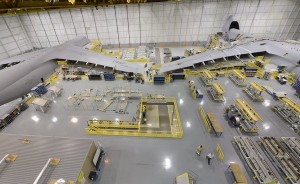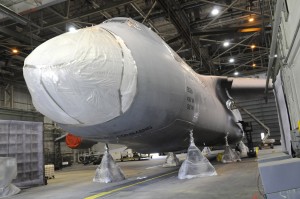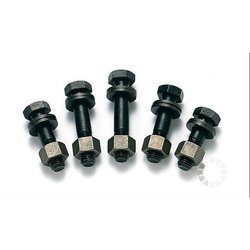 The spending spree and ongoing contracting nightmares in Iraq, aka, Halliburton, et al, are coming home to roost. After fending off critics for several years, the Pentagon and its stable of contractors are tacitly admitting that just maybe the public is getting a bit upset over billions of dollars going out the door with only a slim excuse for oversight, not only in Iraq, but on weapons programs at home. But, hey, Darlene Druyun got a good job offer didn’t she?
The spending spree and ongoing contracting nightmares in Iraq, aka, Halliburton, et al, are coming home to roost. After fending off critics for several years, the Pentagon and its stable of contractors are tacitly admitting that just maybe the public is getting a bit upset over billions of dollars going out the door with only a slim excuse for oversight, not only in Iraq, but on weapons programs at home. But, hey, Darlene Druyun got a good job offer didn’t she?
Here’s the latest from Reuters, preserved for posterity by CorpWatch, on Washington’s re-thinking of the streamlined contracting practices adopted over the past decade.
This was my take on the dark side of acquisition reform served up in the belly of the beast a year ago, via Defense News.
Defense News
April 5, 2004
By David Phinney
Ken Pedeleose’s eyes popped as he plowed through a bill for airplane parts in 1999: $2,522 for a 4½-inch metal sleeve, $744 for a washer, $714 for a rivet, and $5,217 for a 1-inch metal bracket.
 The senior industrial engineer, who worked for the Defense Contract Management Agency in Marietta, Ga., in 1999 had wrestled for more than a year with a Lockheed Martin subsidiary over what he considered to be inflated pricing of spare parts for the U.S. Air Force’s C-5 Galaxy transport plane.
The senior industrial engineer, who worked for the Defense Contract Management Agency in Marietta, Ga., in 1999 had wrestled for more than a year with a Lockheed Martin subsidiary over what he considered to be inflated pricing of spare parts for the U.S. Air Force’s C-5 Galaxy transport plane.
“It was a nightmare,” Pedeleose now recalls. “I kept asking for information to justify the pricing, and I would just get stonewalled.”
So Pedeleose took his concerns to the Defense Criminal Investigative Service, which concluded in a November 2001 report that Lockheed’s prices were “based on cost and pricing data that was known to be false and purposely overstated.”
Now, five years after Lockheed submitted its bill for those C-5 parts, the Department of Defense inspector general has weighed in with a recommendation for more vigilance by department auditors, a powerful senator has joined the fight to cut the spare parts prices, and Lockheed and the Air Force still have not settled on a fair, final price for hundreds of spare parts.
A Lockheed executive declined to detail how the prices were set but did say the company and the Pentagon have agreed that further payments for those C-5 parts are still due. The question of how much those payments will be, however, “remains to be negotiated,” said the company official, who asked that his name be withheld and who declined to discuss further the C-5 program.
For Pedeleose and other auditors, this episode reflects the dark side of acquisition reforms put in place by Congress in the past decade.
The reforms are widely credited with making government purchases of goods and services easier, faster and, in many cases, cheaper. They have allowed the Pentagon to buy more commercial, off-the-shelf items instead of expensive custom equipment designed from scratch.
And they have given contracting officers more ways to buy products and services, including through the use of pre-existing governmentwide contracts.
But the reforms also have spawned new varieties of contracts that may be too big and complex to effectively manage and oversee — especially because federal contracting and auditing staffs have been cut in half since the end of the Cold War.
This reduction in force, Pedeleose and others say, has made it more difficult for contract auditors to do their jobs while making it increasingly tempting for companies to inflate their prices.
Huge Contracts, Fewer Auditors
Despite these well-documented problems, it is now routine practice for the Pentagon to award multi-billion-dollar contracts to provide, for example, soup-to-nuts logistics support for an entire weapon system or a host of support services for U.S. troops deployed in an overseas operation.
 Such indefinite-delivery, indefinite-quantity contracts and virtual prime vendor contracts are now stealing headlines in Iraq, where Halliburton is alleged to have overcharged the government for fuel and meals supplied to U.S. troops.
Such indefinite-delivery, indefinite-quantity contracts and virtual prime vendor contracts are now stealing headlines in Iraq, where Halliburton is alleged to have overcharged the government for fuel and meals supplied to U.S. troops.
Other prime contractors in Iraq are under similar scrutiny by Pentagon auditors. Titan Corp., Fluor Federal Systems, Perini, Washington Group International and others have failed to produce cost and pricing data to justify billings to the government as required by law.
“There are a lot of reforms that are right, but there is also a lot of sloppy implementation,” said Steven Schooner, a former acquisition official at the Office of Management and Budget who is now co-director of the Government Procurement Law Program at the George Washington University Law School.
For contracting officers like Pedeleose, trying to square contractors’ prices can be a major slog. The real costs incurred by contractors for services, goods, deliveries and warehousing can be obfuscated by impenetrable contractual jargon or claimed by contractors to be proprietary, Pedeleose and other auditors complain.
Understaffed auditing agencies now must pick and choose more selectively where they point their magnifying glasses. The Defense Contract Audit Agency, the Inspector General’s (IG’s)Office and the Justice Department do catch some abuses, but there aren’t enough auditors to do a full and thorough check. Says Rep. Henry Waxman, D-Calif., “There are few mechanisms in place to prevent overcharges from occurring in the first place.”
Once a company secures a large contract, Waxman said, it becomes a monopoly: “The more a contractor bills, the more money the contractor makes.”
Danielle Brian, executive director of the watchdog group Project on Government Oversight, agrees, saying these mammoth indefinite-delivery, indefinite-quantity contracts and other procurement reforms cede too much control to prime contractors, which have little or no incentive to contain costs. They also limit the ability of smaller firms to compete for government business, she said.
“It should come as no surprise that companies are exploiting their government contracts,” she said.
The Case of the C-5 Parts
The parts Pedeleose found to be overpriced in 1999 are still under negotiation: Almost 400 remain in dispute.
For example, Lockheed produced and sold to the Pentagon 219 1-inch metal brackets called clip strut support vapor barriers. Lockheed proposed charging $5,217.91 per bracket. This price was based on the premise that each bracket was produced in single-item lots, with each lot assuming the costs of setting up, tooling, manufacturing, overhead costs, profits and other factors.
The Defense Criminal Investigative Service found later that this was untrue: The brackets were produced in lots of larger quantities, and Lockheed knew this.
But the Defense Contract Management Agency rejected that price and, after careful analysis, said a fair cost was $258.90 per bracket. This price was based on Lockheed’s own data, pricing methods and scales of economy, as well as historical data of previous purchases.
The final price is still in dispute; the Pentagon agreed in September 2000 to pay $1.05 in materials costs for each bracket until negotiations on a final price conclude.
When Pedeleose discovered high price tags attached to those C-5 parts in 1999, it was not the first time. Just a year before — in 1998 — he had wrestled with Lockheed over pricing for the very same parts. That struggle resulted in government savings of $34 million, according to his agency’s estimates.
Nevertheless, at the time of his 1999 discovery, Defense Logistics Agency officials were negotiating a sole-source, virtual-prime-vendor contract with Lockheed to provide management and logistics support for 11,000 C-5 spare parts.
The deal was signed in December 2000.
As the single source and broker for the parts, Lockheed was expected to apply modern commercial logistics technology and processes to anticipate the Air Force’s needs for spare parts and coordinate with scores of subcontractors to make sure they were delivered just in time.
But the three-year contract was canceled by the Defense Logistics Agency (DLA) in summer 2002 after 19 months and a cost of $89 million.
“It doesn’t do any good to go into any of the problems,” said DLA legal counsel Lenny Rogers in Richmond, Va. “We weren’t getting what we anticipated and saw a different route to go.”
Rogers admitted the contract had proved too big and unwieldly for the department to manage. After the cancellation, the logistics agency hired nearly a dozen parts suppliers and kept the overall management chores to itself.
“To price 11,000 items is not the smartest thing,” Rogers said. “But if you can get 100 or 50 items at a time, it’s much easier to handle the pricing negotiation. That’s the evolution we went through.”
A Lockheed official, in a written statement, characterized the company’s performance on the C-5 virtual prime vendor contract as “good.”
The contract “was the first supply chain management approach for an entire military weapon system,” the statement said. “It was a significant task and change in approach for the government. We believe the DLA simply chose another path to support the C-5. We respect our customers’ right to decide how their weapon systems are supported.”
Senator Calls for Investigation
In 2002, Pedeleose compiled and sent to Congress a 90-page report entitled “Criminal Vulnerability and Fraud,” that claims the Defense Contract Management Agency and other defense officials repeatedly ignored his warnings that contractors may have been overcharging the Pentagon on the C-5, the F/A-22 fighter and the C-130J transport programs.
Sen. Charles Grassley, R-Iowa, the chairman of the Senate Finance Committee, persuaded the Defense Department Inspector General’s office to launch a series of investigations into whether Lockheed purposefully used false information to justify excessive prices for the C-5 parts.
That investigation is still ongoing, but already Grassley is taking the defense auditing community to task for failing to get to the bottom of whether Lockheed willfully attempted to overcharge the Pentagon for the C-5 parts, as the Defense Criminal Investigative Service concluded in 2001.
A Feb. 23 report by Inspector General Joe Schmitz did not explore the criminal investigative service’s findings that Lockheed used false pricing data. But Schmitz called on the Defense Contract Management Agency and another auditing agency, the Defense Contract Audit Agency, to “maintain vigilance until the price for the remaining parts is negotiated.”
Grassley was unimpressed. In a Feb. 24 letter to Schmitz, he derided the report as “weak and incomplete” and said the IG’s recommendation for continued vigilance fell short of what was needed.
“That conclusion is truly weak,” Grassley told Schmitz. “Those two entities [the defense contract agencies] have a long-standing reputation for turning a blind eye to contractor rip-offs. They are not known for being vicious junkyard dogs when it comes to protecting the taxpayers’ money.”
After six years of fighting over the prices with Lockheed and pushing his managers to act, Pedeleose said he couldn’t agree more.
“The IG ignored its own [Defense Criminal Investigative Service] investigators that found there was fraud in 2001,” said Pedeleose, who believes he has ruined his career and lost any chance for promotion because of his fight over the C-5 parts. “Fraud is staring them in the face, and nothing is done to stop it. Urging continued vigilance is mush.”
Equally disconcerting is the feeling that other auditors may choose not to fight.
“How many other contracts are treated this way?” Pedeleose asks. “How many other times does this happen?”

